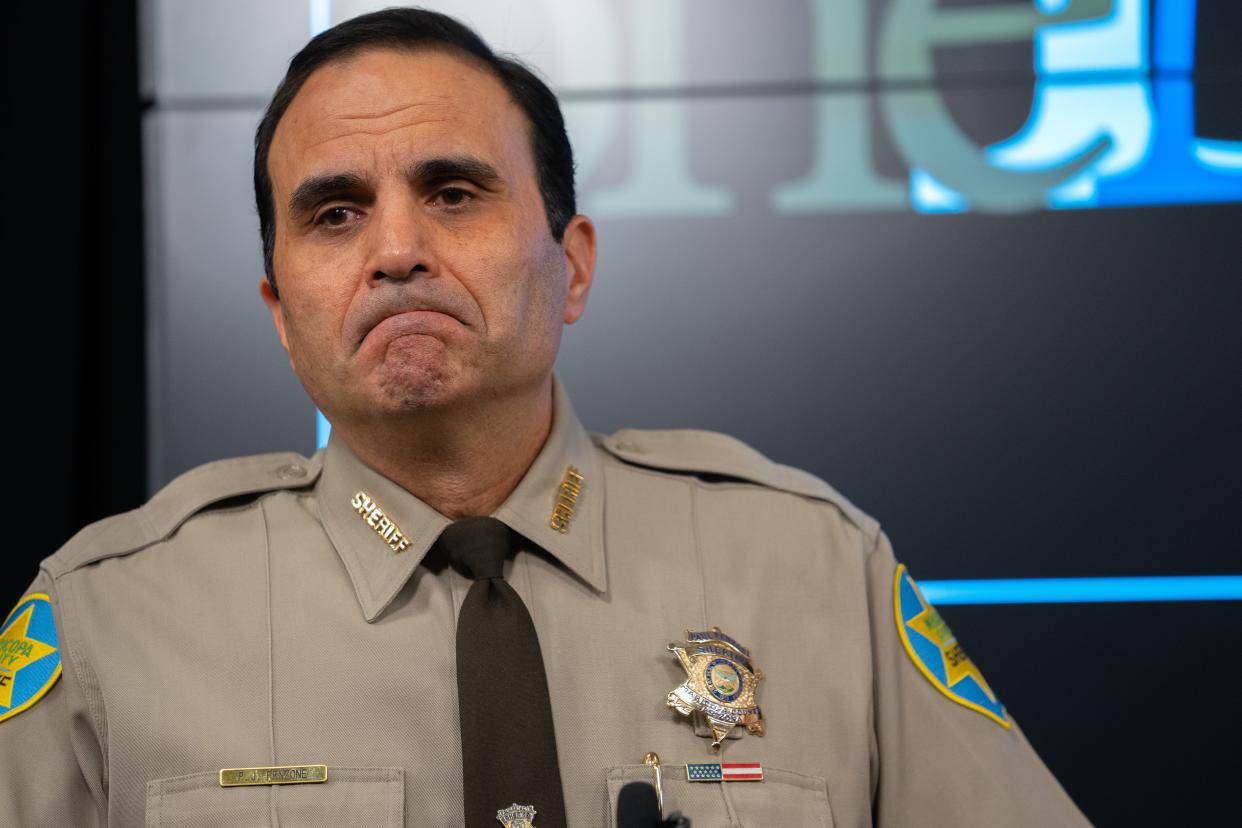Judge to Maricopa County Sheriff's Office: 'I'm not going to give extensions' to misconduct investigations

A federal judge in Phoenix overseeing a racial profiling lawsuit involving the Maricopa County Sheriff's Office said he would not grant any additional time to the agency as it tries to figure out a way to tackle a growing backlog of misconduct investigations against deputies.
"I'm not going to give extensions; I've given long enough,” U.S. District Court Judge G. Murray Snow told attorneys on Friday.
His remarks came during a status conference on the latest court-mandated reforms to weed out racial profiling within the Sheriff's Office.
It is the latest sign of the growing impatience Snow has shown toward the Sheriff's Office, more than 15 years after the racial profiling class-action lawsuit was first filed, and nearly 10 years after Snow issued the first of three court orders mandating changes at the agency.
The lawsuit now known as Melendres v. Penzone has cost county taxpayers $215 million to date, including at least $15 million in the past seven months.
In his latest order from November, Snow found the agency and Sheriff Paul Penzone in civil contempt of court for not doing enough to reduce an investigations backlog that stands currently at 2,057 cases. It takes on average nearly 600 days to close out a case, in defiance of the court-mandated reforms.
Friday's hearing centered on two sections within Snow's order. The deal mandates that the Sheriff's Office commission an independent study by November to determine the best way for the agency to reduce the backlog, and also how to best handle staffing issues at its oversight division.
Penzone, who was not in attendance at the meeting, has blamed staffing shortages in part for contributing to the backlog.
Will an ongoing study satisfy Snow?
The Sheriff's Office is already in the middle of a study to evaluate staffing levels. But it may not be enough to comply with Snow's most recent order.
The agency contracted with the Center for Public Safety Management, a private training and consulting firm, in August. The firm was tasked with examining public safety staffing throughout the Sheriff's Office’s operations, except for the county jails.
In court, lawyers for the Sheriff's Office made the case that the ongoing study should satisfy Snow’s demand for an independent staffing report on the agency’s Professional Standards Bureau, which handles misconduct investigations. Attorney Mary O’Grady said the team has “already done substantial work” and that the court could benefit from a study that looks at the entire organization, including the internal investigations unit.
The firm believes it can do the job, she said. In a letter submitted to the court, senior consultant Robert Handy wrote that his team has experience reviewing internal investigation units across the country and can provide “credible answers” at to whether public safety would suffer if the Sheriff's Office reallocated staff resources to its misconduct unit.
“We are confident in our ability to conduct a thorough examination of MCSO’s Professional Standards Bureau processes, procedures, and staffing in compliance with the court’s third order, and make meaningful recommendations to assist MCSO toward compliance with the court’s orders,” Handy wrote.
But civil rights attorneys raised concerns about the large scope of the review, fearing it would divert attention from the Professional Standards Bureau and only scratch the surface in looking at staffing levels needed to support it.
Civil rights lawyers also noted that the firm has yet to take feedback from all stakeholders while working on the study. Maureen Johnston, an attorney with the U.S. Department of Justice Civil Rights Division, told the court the Community Advisory Board set up by Snow’s prior orders and tasked with rebuilding trust between the Sheriff's Office and Latino communities in Maricopa County, had not been consulted about the staffing study at all.
“The community is an afterthought of this process and not a centerpiece,” Johnston said.
Snow said he wouldn’t immediately greenlight or refuse the Sheriff's Office’s proposal to have the Center for Public Safety Management fold the staffing review into the ongoing study. But the Community Advisory Board should be consulted if the agency expects his approval, he said.
Sheriff's Office struggles with hiring
The Sheriff's Office doesn't need a staffing study to learn its entire operations are understaffed.
While addressing Snow's contempt of court citation in November, Penzone said the Sheriff's Office's progress had been hampered by several large-scale issues in recent years, including COVID-19, protests, election security and the fentanyl crisis. But he also pointed to difficulty in retaining and hiring staff.
In his November order, Snow threatened the Sheriff's Office with hefty fines if the agency did not fill seven vacant investigator positions at the Professional Standards Bureau. O'Grady told the judge the Sheriff's Office had filled the seven positions, averting the sanctions.
But the staffing struggles aren't over. The office currently has 220 civilian vacancies, 84 deputy sheriff vacancies and 651 detention vacancies, officials claimed.
And the two sides in the lawsuit clashed on whether to allow the Sheriff's Office to hire more civilian investigators, which O'Grady said would help them tackle the investigations backlog.
But Johnston said doing so could impact the quality of the investigations, since sworn investigators receive more detailed training on how to identify civil rights violations. She and other civil rights attorneys requested Snow impose court monitoring on the agency's hiring of civilian investigators, which O'Grady said would make a long hiring process with numerous background checks even more complex.
"It's already a pretty cumbersome process," she said. "And we lose folks along that way."
The Sheriff's Office has tried to address that with increased advertising of positions and hiring bonuses for some roles, officials say. But all law enforcement agencies are coming up against a tight labor market, and filling high-level roles, such as positions in the compliance division, requires candidates to have little or no history of discipline. Plus, the Sheriff's Office's federal oversight saga is well-known to candidates.
Civil rights attorneys say mistrust continues
Clearing the backlog of misconduct cases at the Sheriff's Office quickly is crucial to the agency's relationship with the communities it serves, civil rights attorneys said.
Vanessa Pineda, immigrants’ rights staff attorney at ACLU of Arizona, said the Center for Public Safety Management's lack of outreach to the Community Advisory Board amid the ongoing staffing study is unacceptable.
“How can you have community policing without the voices of the impacted community?” she asked.
Additionally, Pineda said the huge backlog of unresolved cases discourages the community from filing additional complaints.
“It lends to the continual mistrust between the community and MCSO,” she said.
Judge Snow said the inclusion of “diverse communities of all kinds” would be necessary to move the case forward, and directed the county to improve its outreach efforts.
“If they thought they could do this on a token basis, it will never have my approval unless the CAB is seriously consulted in a meaningful manner,” Snow said.
Community Advisory Board member Raul Pi?a said he was glad the judge was interested in hearing from the most affected community members.
Pi?a said while it’s easy to get bogged down in numbers, the community should not lose sight of the focus of the case: racial profiling. He was also disheartened to learn that the complaint caseload has still not declined, despite recent hires by the Sheriff's Office.
“It’s hard to find words to express the frustration,” Pi?a said. “If you are vulnerable to racial profiling in the county as a Hispanic vehicle operator, and there’s no mechanism to be heard, there’s no remedy for that offense. Wherever you go, you’re stuck in the middle of this perfect storm of malpractice and unconstitutional policing. It’s a travesty.”
What's next in the 9th Circuit?
Snow's order finding Penzone in civil contempt of court mirrors a 2016 order he issued against his predecessor, former Sheriff Joe Arpaio, who was later found in criminal contempt of court as well. Snow accused Arpaio of openly disregarding court-imposed reforms to stop racially profiling Latino drivers in Maricopa County as part of the ongoing class-action lawsuit and referred criminal contempt charges.

The next year U.S. District Court Judge Susan Bolton convicted Arpaio, before then-President Donald Trump pardoned him. Penzone took over enforcement of the court-mandated reforms that same year when he ousted Arpaio in that year's election.
While Penzone faces only civil contempt of court, the sheriff said he plans to appeal the judge's decision to the U.S. 9th Circuit Court of Appeals in San Francisco. The Sheriff's Office has until April 19 to submit the grounds for its appeal. But in the meantime, Penzone's attorneys said they plan to abide by Snow's court orders.
This article originally appeared on Arizona Republic: Judge to Sheriff Penzone: No extension to clear racial profiling case
